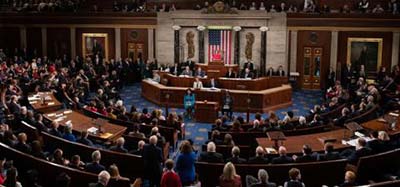
House Passes MBA-Opposed Bill Expanding Servicemember Educational Assistance

The House on Wednesday passed a bill opposed by the Mortgage Bankers Association and other industry trade groups that would expand eligibility for servicemember educational assistance, but also impose fees that would translate into higher costs for veterans.
By a 273-135 vote, the House approved H.R. 1836, the Guard and Reserve GI Bill Parity Act of 2021. Introduced by Rep. Mike Levin, D-Calif., the bill expands eligibility for Post-9/11 GI Bill educational assistance. Specifically, the bill adjusts the type of service that entitles a member of the Armed Forces, reserves or National Guard to such assistance.
Under the bill, service by a reservist or National Guard member that is entitled to pay counts toward benefit eligibility. Such service includes training, active military service, inactive training and general duty for which basic pay is warranted.
However, to fund the program, the bill increases funding fees associated with purchase loans and loans to refinance existing mortgages, including Interest Rate Reduction Refinance Loans, guaranteed by the Department of Veterans Affairs—funding fees that are paid by veterans – either upfront or, more often, through financing of their loans.
Ahead of the House vote, MBA and the National Association of Realtors sent a letter to House leadership in opposition of H.R. 1836, arguing that the increase in funding fees translates directly into higher costs for all veterans seeking to purchase a home or refinance their mortgage.
“Although H.R. 1836 would use the fee increases to fund valuable educational assistance programs, we believe the use of the VA home loan program for this purpose is inappropriate, the letter said. “For many veterans, VA home loans represent their only opportunity to achieve sustainable homeownership. Further increases to the fees they must pay will eliminate this option for some of these veterans.”
Rapidly rising home values throughout the country, while beneficial to the finances of existing homeowners, threaten to push homeownership out of reach for a new generation of consumers. This dynamic underscores the importance of the VA home loan program – notably, the ability of most veterans to obtain financing without a required down payment.
The letter argued that by piling additional fees onto veterans seeking to refinance, Congress would be blunting the very stimulus that other parts of the federal government are attempting to promote. “These funding fee increases are not correlated with the risks associated with the VA home loan program, putting the funding fee schedule into greater misalignment with the risk profile of veteran borrowers,” it said. “The continued use of VA funding fees to pay for expenditures unrelated to housing severely threatens the VA home loan program –perhaps not because of any individual funding fee increase, but rather through a ‘death by a thousand hikes.’”
The letter also noted use of VA funding fees to pay for non-housing-related expenditures represents a highly problematic practice – requiring veterans to subsidize what should be earned benefits. “The costs of these additional benefits…should not fall on the backs of those veterans seeking to become homeowners or those veteran homeowners seeking to lower their monthly mortgage payments,” the letter said. “Simply put, H.R. 1836 transfers funds from one set of veterans to another set of veterans and should not be considered an expansion of benefits but rather a reprioritizing of them.”
The bill now goes to the Senate, where there is no corresponding legislation.
